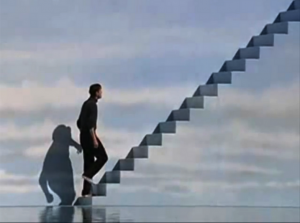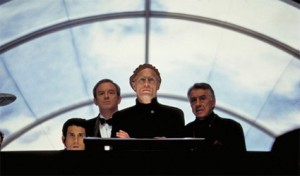BREAKUP TIME
#LINDSAYSNEXTCHAPTER (/& EXTREME EXTREME TRANSFERENCE)
RUMORS
In a 2010 Grace Kelly inspired front-cover profile of Lohan for Vanity Fair, the Nancy Jo Sales we know and love states: “Lindsay looked a little raw. And yet shining through her worry and stress and whatever else was currently affecting her mood was her all-American beauty, finer and more delicate in person than in pictures. She still looked like a movie star. She smelled of cigarettes and exotic perfume.”
A very embarrassing thing I have fully embraced about myself is that my brain holds too much information about Lindsay Lohan. In a hypothetical quiz where I was presented with a random photo of the actress, I would swiftly be able to easily identify what specific era it is derived from, as well as extensive details that to someone unfamiliar with her saga would seem chimerical. When names like Patrick Aufdenkamp become familiar, I begin to wonder why I care so much. There is an element of irony in my admiration, but there is no doubt I do hold a positive stance about the starlett.
Tabloids and gossip magazines often report the behaviors of young stars. A large segment of the tabloids focus on those who act entitled and expect special treatment due to their fame. The inquiry ‘Don’t you know who I am?‘ is most frequently perceived as pompous, but maybe it should also be interpreted as the absolute cry for help. The person posing such a self-important question is so unaware of his/her reality that s/he needs others to remind him/her of it. The worth or lack of worth ultimately appears to fully depend on the recognizability of the individual.
TRUTHS
In “The Schema of Mass Culture,” Adorno argues that the commodification of the cultural industry ceases its distinction from pragmatic life: “On all sides the borderline between culture and empirical reality becomes more and more indistinct.” Consequently, the individuals who find themselves in the culture industry confront the loss of their private reality, especially when their public presence is one in which they are investing in to develop a personal brand. As the person becomes the product, the risk of losing a part of their previously held individuality becomes grave: the personality features that are expected to generate more profit will comprise the new “person,” more representative of the brand/ product.
Animated Gifs as Cinema
I was planning to put up the next installment in my experimental fiction series today (part 1, part 2), but school has interfered. (I’m writing a paper on Dickens’s use of the narrative present in Great Expectations, plus grading 40-something research papers written in response to Hanna Rosin’s The End of Men: And the Rise of Women.)
In the off chance that you’d like to read something new by me, I recently published an article at the film site Press Play, “Are Animated Gifs a Type of Cinema?” Since then, Landon Palmer has responded with an article at Film School Rejects (“Animated Gifs are Cinematic, But They’re Much More Than Cinema“), as has Wm. Ferguson at the 6th Floor, the New York Times Magazine‘s blog (“On the Aesthetics of the Animated GIF“). I’m planning a follow-up post as well as an interview with Eric Fleischauer and Jason Lazarus, the directors of the gif anthology film twohundredfiftysixcolors, whose premiere I managed to catch a few weeks back. And the Press Play article is itself a follow-up to two articles I posted at Big Other in early 2011: “How Many Cinemas Are There?” and “Why Do You Need So Many Cinemas?”
I’m only just beginning my studies on the gif, so I appreciate any and all feedback.
Hot, Young Poets!
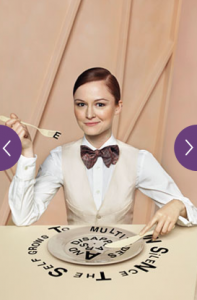 I find it sometimes necessary, when recommending a poet’s work to a non-poetry reader to say, “I don’t read poetry, but…” and then plug whomever it may be. This is a half-true statement. I don’t read much poetry. I read a little and the little that I read (Berryman, Lasky, Flynn, Nelson) I absolutely love. But poetry, as a whole, seems to exist for poets. It’s something that poets read either in the hopes of being better poets or because they have a nice time reading it. I don’t know anyone who reads poetry who doesn’t also write it. True, there are exceptions. A lot of fiction and non-fiction writers read a little poetry (like myself) but for the most part, poetry is consumed by poets.
I find it sometimes necessary, when recommending a poet’s work to a non-poetry reader to say, “I don’t read poetry, but…” and then plug whomever it may be. This is a half-true statement. I don’t read much poetry. I read a little and the little that I read (Berryman, Lasky, Flynn, Nelson) I absolutely love. But poetry, as a whole, seems to exist for poets. It’s something that poets read either in the hopes of being better poets or because they have a nice time reading it. I don’t know anyone who reads poetry who doesn’t also write it. True, there are exceptions. A lot of fiction and non-fiction writers read a little poetry (like myself) but for the most part, poetry is consumed by poets.
Which leads me to wonder: Do any poets read Oprah Magazine? And do any poets wear very simple, straightforward $341 shirts? Does this seem like an irrelevant question? And how could it not?
Oprah Magazine just published a fashion shoot in which young female poets are dressed up in very nice clothes. To make it obvious that they were poets, their words were scattered artfully around the image. Supposedly, this is part of Oprah’s “National Poetry Month” Issue, the Oprah empire’s attempt to get your mom to read some poetry, which I feel is a worthy, albeit fraught, endeavor. If every non-poetry reader (or non-poet) found at least one poet whose voice they liked, and if we all bought a book by that poet, I feel the effect could be tremendously positive. But is that what is really going on here?
Here we see full-color spreads of the young, female poets, their words lying disjointed around them. Some of these poets have not yet even published a collection, or if they do, they’re not mentioned in the little blurbs accompanying the shots. One is Anna Moschovakis, an editor at Ugly Duckling. One is modeling a style deemed ‘Perfectly Punk,’ and looking up at a line of (her own?) poetry that references a studded belt.
And it’s just a little depressing, somehow. Is fashion really a good way to sell poetry, to get the O-reading masses to read some poems? Or is this, as I suspect, just fashion for fashion’s sake, and the poetesses is just the unlikely vehicle for the clothing the needs advertising?
I really do want your mom to read poetry. I want your dad to read it to. But really, I will settle for them reading a book of any kind. Sadly, I think this fashion shoot is going to sell a lot more $995 jackets designed by ‘Haute Hippie.’ (I am depressed that I now know a clothing designer named ‘Haute Hippie’ even exists.)
Criswell Predicts
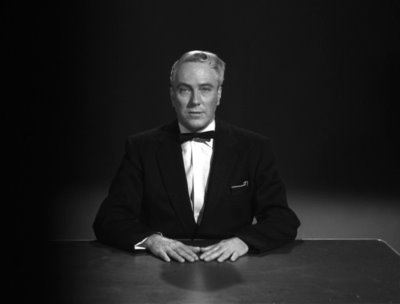
Jonathan Franzen’s new novel Freedom will be the next Oprah Book Club selection. Between the two of them, nice will be made.
And remember: future events such as this will affect you in the future.
What do you think about book trailers?
Over at Salon.com, Laura Miller has a piece called “Never coming to a screen near you: Why promoting books with movie-style trailers is a silly idea.” Here’s a snippet of her argument:
Alas, Web videos are even more numerous than books, and as with books, the vast majority of them go unwatched and uncelebrated. A few manage to command that most mysterious of all magical powers, word of mouth, and become sensations, but that kind of success is as impossible to force as an “Oprah” booking. In the meantime, an author’s energies have been funneled into a project that’s unlikely to yield many results.
Here is an example:
httpv://www.youtube.com/watch?v=1chqggKw_Ds&feature=player_embedded
1 Year of O
Via Clusterflock, a composite image of one year of covers of O Magazine, together at last:
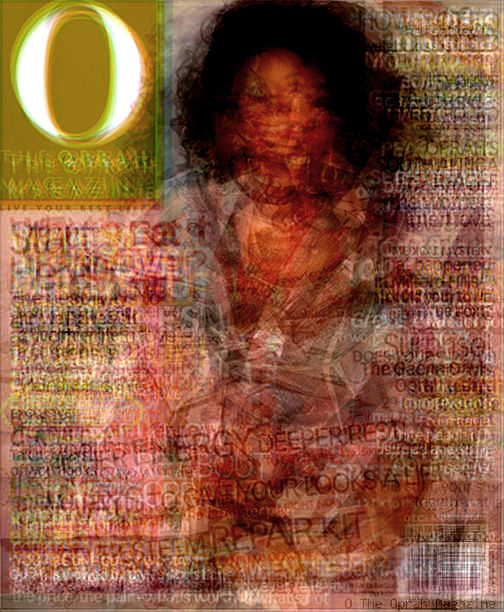
December 8th, 2009 / 1:48 am
There is no reason to see the film version of The Road. Sure, it looks OK, and the acting is OK, but if you’ve read it, it’s a word for word thing mostly, and takes away from the imagination. It actually kind of made me despise the book, which had managed to make it past even Oprah. Corn.
Memoirs are bullshit
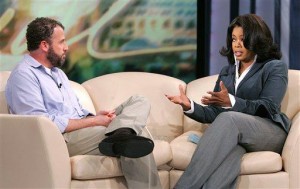
James Frey was forced to sit down and let Oprah tear him to pieces before a studio audience because he committed the greatest crime a writer could commit. He made a bunch of people feel something when they read a novel. They thought they were reading something real. They connected with it and felt something. Turned out it wasn’t precisely real. It was embellished. It was changed to serve the story instead of the reality that the story was based on. All those folks who spend their lives vicariously feeling something through other people’s tragedies were angry that they felt something for a story instead of something that happened in the real world. They pilloried the jerk who went and made them feel something over a work of fiction.
This fetish for “real” is the most embarrassing part of the contemporary reading public. The memoir is, for the most part, just exhibitionists flashing their genitalia at voyeurs. Our Puritan ancestry is likely to blame for all of this.
Let’s hope the memoir dies soon and we can get back to the more important writerly pursuit: making shit up.
“What America needs most is tact.”
(Have I posted this before? Am I a broken record? Sorry.)

